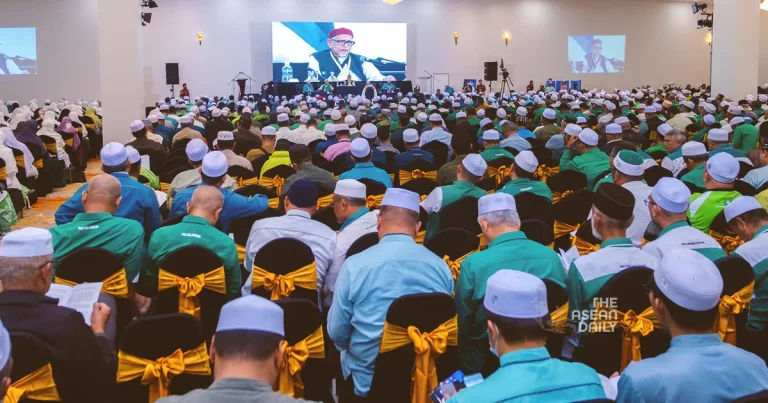29-3-2024 (KUALA LUMPUR) In the bustling central market of Kuala Terengganu, amidst the aroma of spices and the chatter of traders, Mdm Raqiah Abdullah sits on a rickety stool, flipping through the pages of the Quran. Wrapped in a green cloth bearing the flag of Malaysia’s conservative party Parti Islam Se-Malaysia (PAS), the Quran serves not just as a religious text but as a symbol of allegiance for Mdm Raqiah and many others like her. At 69 years old, she staunchly believes that supporting PAS is not just a political choice but a religious duty, echoing sentiments shared by an increasing number of Malaysians in recent years.
For decades, the political landscape in Malaysia has been dominated by parties like the United Malays National Organisation (UMNO), but cracks in its stronghold began to appear, particularly after scandals such as the 1Malaysia Development Berhad (1MDB) controversy tarnished its image. As UMNO faltered, PAS seized the opportunity to fill the void, presenting itself as the guardian of Malay-Muslim interests. Under the leadership of figures like Abdul Hadi Awang, PAS gained momentum, appealing to voters with its steadfast commitment to upholding Malay-Muslim rights and implementing Shariah laws.
In neighbouring Indonesia, a similar narrative unfolds, albeit with notable differences. Concerns over the rise of political Islam and religious conservatism have loomed large, especially during elections. Yet, unlike Malaysia, where PAS has consolidated its position, Indonesia’s political landscape remains more diverse and fragmented. Despite initial fears of religious conservatism influencing the polls, candidates refrained from exploiting identity politics, demonstrating a level of political maturity that seemed lacking in Malaysia.
The divergent paths taken by Malaysia and Indonesia offer valuable insights into the complexities of political Islam in Southeast Asia. In Malaysia, PAS’s ascent to prominence underscores the potency of identity politics, particularly among the Malay-Muslim majority. The party’s unwavering stance on issues like Shariah law resonates deeply with its supporters, who view it as a bulwark against perceived threats to their religious and cultural heritage. However, this rigid adherence to conservative principles risks exacerbating social divisions and undermining the country’s democratic ideals.
Conversely, Indonesia’s experience highlights the importance of pluralism and tolerance in navigating the challenges posed by political Islam. Despite being the world’s most populous Muslim-majority nation, Indonesia has managed to maintain a delicate balance between religion and secularism, largely thanks to its founding ideology of Pancasila. This inclusive framework, which embraces diversity and enshrines principles of justice and social harmony, has helped mitigate the influence of radical elements and fostered a more inclusive political discourse.
As Malaysia grapples with the rise of political Islam and its implications for democracy, there are valuable lessons to be learned from Indonesia’s experience. Rather than succumbing to the politics of fear and division, Malaysian leaders must strive to build a more inclusive and equitable society, one that respects the rights and aspirations of all its citizens. By embracing pluralism and fostering a culture of tolerance, Malaysia can chart a path towards a more prosperous and harmonious future for generations to come.




